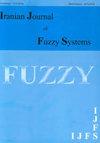Preference implication-based approach to ranking fuzzy numbers
IF 1.2
4区 数学
Q1 MATHEMATICS
引用次数: 3
Abstract
Dombi and Baczy'{n}ski presented a new approach to the problem of implication operation by introducing the preference implication, which has very advantageous properties. In this paper, it is presented how the preference implication is connected with soft inequalities and with sigmoid functions. Utilizing this connection the preference implication-based preference measure for two fuzzy numbers is introduced and its key properties, including the reciprocity, are described. Then, the exact expression for computing the new preference measure for trapezoidal fuzzy numbers is presented. Here, using the new preference measure, two crisp relations over trapezoidal fuzzy numbers are introduced. It is shown that one of them is a strict (but not a total) order relation, and the other one is an equivalence relation. The strict order relation can be used to rank comparable fuzzy numbers, while the equivalence relation, which we call the indifference relation, expresses that the order of some fuzzy numbers is indifferent. These two crisp relations can be used to rank a collection of trapezoidal fuzzy numbers. Lastly, the proposed ranking method is compared with some well-known existing fuzzy number ranking methods.基于偏好隐含的模糊数排序方法
Dombi和Baczy'{n}ski提出了一种新的方法,通过引入偏好隐含来解决隐含运算问题,该方法具有非常有利的性质。本文讨论了偏好蕴涵如何与软不等式和s型函数联系起来。利用这种联系,引入了基于偏好隐含的两个模糊数偏好度量,并描述了其关键性质,包括互易性。然后,给出了计算梯形模糊数偏好测度的精确表达式。这里,利用新的偏好度量,引入了梯形模糊数上的两个清晰关系。证明了其中一个是严格序关系(但不是全序关系),另一个是等价关系。严格序关系可以用来对可比较的模糊数进行排序,而等价关系,我们称之为无差异关系,表示某些模糊数的顺序是无差异的。这两个清晰的关系可以用来对梯形模糊数集合进行排序。最后,将本文提出的排序方法与现有的一些知名模糊数排序方法进行了比较。
本文章由计算机程序翻译,如有差异,请以英文原文为准。
求助全文
约1分钟内获得全文
求助全文
来源期刊
CiteScore
3.50
自引率
16.70%
发文量
0
期刊介绍:
The two-monthly Iranian Journal of Fuzzy Systems (IJFS) aims to provide an international forum for refereed original research works in the theory and applications of fuzzy sets and systems in the areas of foundations, pure mathematics, artificial intelligence, control, robotics, data analysis, data mining, decision making, finance and management, information systems, operations research, pattern recognition and image processing, soft computing and uncertainty modeling.
Manuscripts submitted to the IJFS must be original unpublished work and should not be in consideration for publication elsewhere.

 求助内容:
求助内容: 应助结果提醒方式:
应助结果提醒方式:


